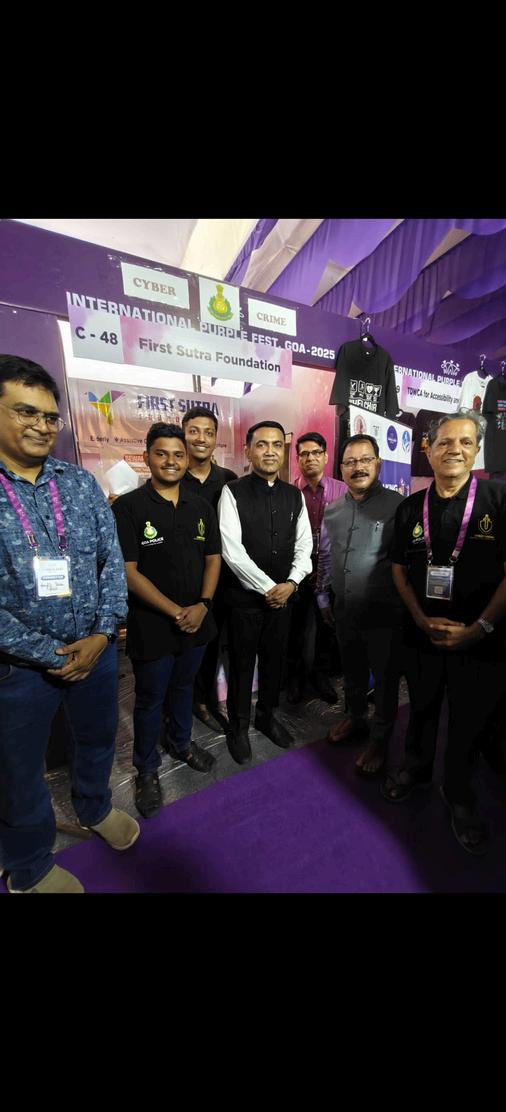MESSAGE FROM SP CYBER CRIME, GOA POLICE
It is heartening to see Cyber Defenders continue its mission of spreading awareness about online safety and responsible digital behaviour. In an age where technology connects us all, understanding its risks and using it wisely is more important than ever.
This edition’s focus on Cyber Bullying addresses a challenge that affects people across all age groups, especially the youth Online harassment can leave deep emotional and psychological impacts, and awareness is the first step toward prevention Each of us has a role to play in making the digital world a safer and kinder space
I commend the efforts of the Cyber Defenders team and the Cyber Yoddhas for their dedication in educating the public and empowering them with the knowledge to stay safe online Initiatives like these strengthen our collective fight against cybercrime
~ Shri RAHUL GUPTA, IPS Superintendent of Police North, Crime & Cyber Crime Goa Police
BLOCK, DOCUMENT & DO NOT RESPOND
Cyberbullying is a type of bullying that takes place through digital devices such as cell phones, computers, and tablets. It can occur in various forms, including text
messages (SMS), instant messaging apps, and online platforms like social media networks, forums, and gaming websites These environments allow users to view, engage with, and share content, which can facilitate harmful interactions.
The essence of cyberbullying lies in the act of sending, posting, or sharing negative, harmful, false, or malicious content about another person. This can encompass a wide range of behaviours, such as spreading rumours, posting humiliating photos, or creating fake profiles to impersonate someone. Furthermore, cyberbullying can involve the sharing of private or personal information, leading to significant emotional distress, embarrassment, or humiliation for the victim.
In some instances, cyberbullying crosses legal boundaries and may constitute unlawful or criminal actions This could include harassment, threats, or even the distribution of private information without consent, which can have serious repercussions not only for the victim but also for the perpetrator
Cyberbullying platform is distinguished by several key characteristics that enhance its appeal It operates 24/7, allowing users to access information and engage with content at any time, day or night, which meets the demands of a fast-paced world. It offers a unique potential for anonymity, enabling individuals to share their thoughts and opinions without the fear of judgment or exposure, fostering open dialogue and honest expression. And, the design of the platform facilitates the rapid dissemination of content, allowing it to reach a broad audience in a matter of minutes or even seconds this viral capability significantly amplifies the impact of messages, making it an essential tool for information sharing and social influence.
WHERE DOES CYBER BULLYING HAPPEN?
Social Media
Messaging Apps
Direct & Instant Messages
Emails
Forums & Chat Rooms
Gaming Communities
In the contemporary digital landscape, the widespread use of social media and online platforms enables comments, photographs, posts, and shared content to be readily accessible to both acquaintances and strangers alike The material that individuals choose to share online including both personal insights and potentially negative or derogatory remarks contributes to a permanent public record that reflects their beliefs, activities, and conduct This digital footprint can significantly influence an individual's reputation and is often available for assessment by educational institutions, employers, colleges, organizations, and others who may seek to evaluate the individual both now and in the future
The implications of cyberbullying extend beyond those who are directly targeted; they can also adversely affect the reputations of the perpetrators and any bystanders who engage in or tacitly support such behaviour.
Cyberbullying is a crime in India and is punishable under various laws like the Information Technology (IT) Act, 2000, and the Indian Penal Code (IPC), so report it if you are a victim, you can either register a complaint on https://cybercrime.gov.in/ or call 1930.
UNDERSTANDING
We've all felt it, that sinking feeling in your stomach when you see a nasty comment, a mocked photo, or a cruel message pop up on your screen. In a world where our lives are lived online, bullies have found a new playground. But please, hear this: cyberbullying is not "just online drama." It's a harmful and, importantly, an illegal act. And now, India's laws are stronger in having your back.
RECOGNIZING IT IS THE FIRST STEP
The Torrent of Hate: Continuous abusive messages or comments meant to humiliate.
The Stolen Selfie: Your photos altered or shared without consent.
The Fake ‘You’: A false profile created to damage your image or deceive others.
The Unwanted Shadow: Online stalking that feels threatening or invasive.
Harassment online is never your fault.
India’s New Cyber Laws Offer Real Protection
Criminal Intimidation (BNS):
Harassment or threats online → up to 2 years imprisonment (7 years if life threat)
Morphed / Shared Photos:
Sharing intimate or explicit content without consent → 3 to 7 years imprisonment
Fake Profiles / Identity Theft (IT Act):
Creating fake accounts to harm or defraud → up to 3 years jail + fine.
Online Defamation:
Spreading lies or false claims → up to 2 years imprisonment.
What To Do When It Happens
Your 5-Step Action Plan:
Pause Don’t Respond: Don’t give them what they want
Collect Proof: Screenshot everything, save messages and links
Report Online: Flag or report the content/profile immediately
Talk About It: Share with a trusted person don’t deal with it alone
File a Complaint: Visit your local police station or report at cybercrime gov in
You Are Not Overreacting
Your safety and peace of mind are not negotiable These new laws were created for you, to give you a clear path to justice By standing up, you're not just protecting yourself you're helping to make the internet a kinder, safer place for everyone. Your voice matters. Use it.
As a counsellor, I often meet youngsters struggling with various challenges academic pressure, relationship issues, identity crises, and emotional distress. But one case that remains etched in my mind is that of a young student who walked into my office one afternoon, eyes swollen from crying and hands trembling as she clutched her phone. At first, she found it difficult to speak. When she finally did, her words came out in broken whispers “Ma’am, they’re commenting things about me.” What followed was a heart-wrenching story of cyberbullying, anonymous messages, edited pictures, cruel comments, and the slow erosion of her self-worth.

She had stopped attending classes, deleted her social media accounts, and barely slept. The virtual world, which should have been a space for connection and creativity, had turned into a battlefield for her emotions What struck me most was not just the pain she felt, but the deep sense of shame and helplessness that came with it She believed it was somehow her fault that she had invited this cruelty by sharing too much or trusting the wrong people
As I listened, I was reminded of how easy it is to underestimate the damage words can cause when they are typed behind screens
Cyberbullying doesn’t end when one logs out; it lingers in the mind, feeding anxiety, depression, and loneliness The constant exposure to judgment online can distort a young person’s self-image and make them feel trapped in an invisible cage.
Together, we began the slow process of healing. I encouraged her to talk openly, to reclaim her sense of safety, and to report the incident to trusted authorities. With time and consistent counselling, she started rebuilding her confidence. I could see glimpses of the cheerful, curious student she once was. It was a journey from fear to self-acceptance-not easy, but deeply inspiring.
and self-worth
• Sleep disturbances and fatigue: The fear of further attacks can cause chronic stress and sleeplessness
• Social withdrawal: Victims often isolate themselves, avoiding peers or online spaces altogether
• In extreme cases, suicidal thoughts: Persistent bullying and a lack of emotional support can lead to feelings of despair and selfharm ideation
Cyberbullying is not merely an online issue it is a mental health crisis that demands collective awareness and compassion. We must continue to foster safe spaces for dialogue, emotional resilience, and advocate for responsible digital citizenship.
~ Ms. Irene George Counselling Psychologist
Cyberbullying is one of the biggest problems of our digital world It happens when someone uses social media, messages, or online games to hurt or embarrass others
What makes it worse is that it can happen anytime, even when the victim is alone
People may spread lies, post mean comments, or share private pictures to make fun of someone. These actions can deeply affect the victim’s confidence and mental health, leading to anxiety or depression.
To stop cyberbullying, we must speak up and support victims. Parents and teachers should talk about online safety, and victims should report bullying to someone they trust. Social media platforms must also remove harmful content quickly.
Together, we can make the internet a safer and kinder place. Let’s use our screens to spread positivity, not hate.
In today’s digital world, words travel faster than light and sometimes, they burn brighter than fire.
Cyberbullying isn’t just a post, a meme, or a message; it’s an invisible wound that spreads through screens and settles deep in the mind. Unlike traditional bullying, this one doesn’t stop at the school gate or the office door it follows the victim home, hiding behind fake profiles and anonymous comments What makes it worse is the silence that surrounds it the “seen” messages, the ignored pain, the unspoken fear of being judged
Every click, share, or forward can either heal or hurt someone The choice lies in our hands to be silent spectators or responsible digital citizens Let’s create a cyberspace where kindness trends, empathy goes viral, and humanity never logs out
Because a strong password may protect your account, but only compassion can protect someone’s heart
The Silent Attack; Cyber Bullying




















